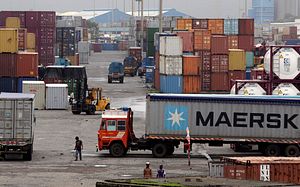On June 5, 2019, the United States terminated India’s designation as a beneficiary developing country under the Generalized System of Preference (GSP) trade program. This means that nearly 2,000 products, including auto products and textiles, and up to $5.6 billion in Indian exports can no longer enter the United States duty-free.
What are the broader effects of this move, and why did it happen? While there has been much speculation around the factors driving the U.S. decision – from trade imbalance and lack of reciprocity to a weak intellectual property regime – one interesting aspect is to examine the new restrictions on e-commerce companies.
The Indian market is crucial for American e-commerce firms. Having been shut out of China, they view the untapped potential of India’s e-commerce market as an important source of growth in the coming years. This opportunity is what spurred Amazon’s $5 billion investment in the local market and Walmart’s $16 billion investment into local player Flipkart.
Any rules that restrict the potential operations of these companies in India might be seen a significant challenge – yet that is exactly what has happened. Over the past year, the Indian government has adopted new data localization and e-commerce rules that work against the long-term commercial interests of foreign online retailers in the country.
Foreign investors were traditionally not allowed to control and market their own inventory on their e-commerce platforms, instead they were only permitted to operate as marketplace platforms where others sell goods to retail consumers. Amazon and Walmart–controlled Flipkart – now two of India’s largest e-commerce sites – have relied on intermediate companies in which they have direct or indirect stakes to overcome this hurdle.
The recently adopted e-commerce rules aim to close this loophole, classifying sellers who purchase large inventory shares from other group companies (like Amazon) as being controlled by those e-commerce companies. In addition, any data generated by these companies would now have to be stored in data centers and servers within the country.
The new laws have prompted a significant overview of Amazon and Flipkart operations. But it is easy to see why they might oppose the new rules.
Reports have suggested that Nasdaq-listed Amazon and NYSE-listed Walmart lost a combined $50 billion in market cap when the new policy came into effect, and had to stop or discontinue selling multiple products on their portals.
With so much at stake, it is possible that these foreign players would lobby their home government to intervene diplomatically. When combined with other sticky trade issues on the U.S.-India agenda, the U.S. government has responded by revoking India’s trade benefits. Yet, despite the layered issues in play, this was not an inevitable outcome.
In recent research, my co-authors and I examined previous disputes of this nature between the United States and developing counties like India. The U.S. firm in each dispute contended that their property rights were violated by actions of the foreign government. We found that in about a third of the cases when U.S. firms contended that their property rights were violated by the actions of a foreign government, the U.S. government intervened diplomatically on their behalf.
In these disputes, high-level U.S. officials, legislators, ambassadors and other representatives regularly pushed the very highest officials – often the president or prime minister of the developing country – to resolve the issue, thus linking the dispute of a U.S. investor to the bilateral diplomatic agenda. But explicit threats of coercive sanctions – such as revoking trade or aid benefits or linking other priorities of the developing country to the dispute’s resolution– were rare, occurring in only about 3 percent of cases.
This research suggests that American investment diplomacy was much more “benign” during the mid-1990s through to the mid-2000s – the period of the study. The more aggressive policies adopted by the current U.S. administration suggests a return to approaches more common during the Cold War era.
India, for its part, has pushed through with its e-commerce reforms and the new Commerce and Industry Minister has announced that the country will try to build up its export competitiveness without relying on GSP benefits. While negotiations on a potential trade deal with the United States continue, Amazon and Walmart are likely to have to adapt their business models in India to comply with the new regulations.
Srividya Jandhyala is an associate professor in the management department at the ESSEC Business School Asia Pacific.

































